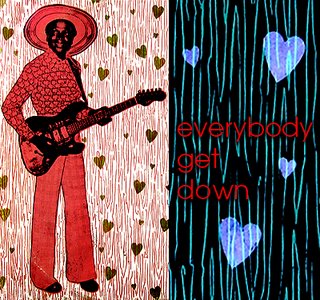
Who on WFMU is not awesome? This is a serious question. You Max Funsters may — nay, should — already know all about the likes of The Best Show and Seven Second Delay, but the framework built by the entire schedule of what I shall dub America’s ultimate free-form radio station is packed with the styrofoam of pure awesome. For just one example, take Radio Freetown [iTunes link], which airs Mondays at 7pm Eastern. Behind the mic and on the turntables is DJ Frank O., a.k.a. DJ Franc O., a.k.a. Frank Gossner, a German so dedicated to his mission of finding and preserving rare West African pop and rock vinyl from the 1970s that he blogs about the stuff, is the subject of a documentary about the stuff and, of course, sends the stuff out weekly on the frequency of 91.1. This dude, let it be said, is an awesome dude.
Fortunately for listeners outside of Jersey and NYC, WFMU boarded the podcasting boat early, and consequently Frank’s broadcast spinning sessions are available everywhere in the world — even in the countries his music itself comes from: your Ghanas, your Benins, your Togos, your Nigerias, your Ivory Coasts, your Guineas. Having grown weary of the “sleazy listening” he made his name playing in New York clubs and the classic funk he then became known for laying down in Berlin, Frank relocated to Guinea and picked up a nasty addiction to its dusty old vinyl. Radio Freetown‘s cuts are the fruits of a dogged quest through the west side of the continent: by foot, bus or rickety makeshift taxi, Frank scoured (with the aid of a network of friends) the remains of all the collections he could dig up, searching for that sweet Afrobeat, Afro-funk, Afro-pop and Afro-rock.
It’s tough to know exactly how to describe this music. Though certain recordings are unexpectedly slick, most of it’s decidedly “lo-fi”, though not in an unappealing, deliberate or ironic way. (Especially not in an ironic way.) West African musicians of the 1970s were, perhaps unsurprisingly, working with fairly basic technology even for the time, and thus had to creatively compensate or adapt to their gear’s limitations. The result is a bold, enthusiastic sound filled with sharp horns, spidery guitar, distinctively solid rhythms, borderline-hypnotic repetition and lord knows how many sung languages. So perhaps it’s easier to describe its sound than to covey, with much precision, its appeal; in the interest of not dancing too much about the architecture, it’s probably best to leave the music to speak for itself. (The music and its cover art, to be precise. Who on Earth, no matter the region, could see covers like these and not want to hear what’s pressed into the vinyl inside them?)
Listening to Frank’s mixes has, for your Podthinker, been something of an enlightenment. If you hang out with music people, you know — maybe all too well — that anyone who’s really into organized sound can easily become afflicted with tunnel vision, or, as it were, tunnel hearing. They delude themselves into thinking that they “know what they like” and tribally restrict their allegiances to a certain style, consciously or unconsciously avoiding all alien musical stimuli, forgetting that when the total music-producing area of the world is multiplied by the time it’s been producing music, a huge probability space opens up. In it hide so very many many excellent tracks, albums and entire genres that few have ever even heard of. In previous eras, they’d have an excuse for their ignorance; now, thanks to the sweat-of-the-brow efforts of hardworking DJs like Frank, they don’t.
Vital stats:
Format: music; 70s West African music, specifically
Running since: October 2008
Duration: ~1h
Frequency: weekly
Archive available on iTunes: previous month only (but like all WFMU podcasts, older shows can be heard via the fate worse than death that is using RealPlayer)
[Podthinker Colin Marshall receives all his way-out-of-normal-experience music suggestions at colinjmarshall at gmail. Discuss Podthoughts on the forum here or submit your own podcast for the next by-Max-Funsters column here.]